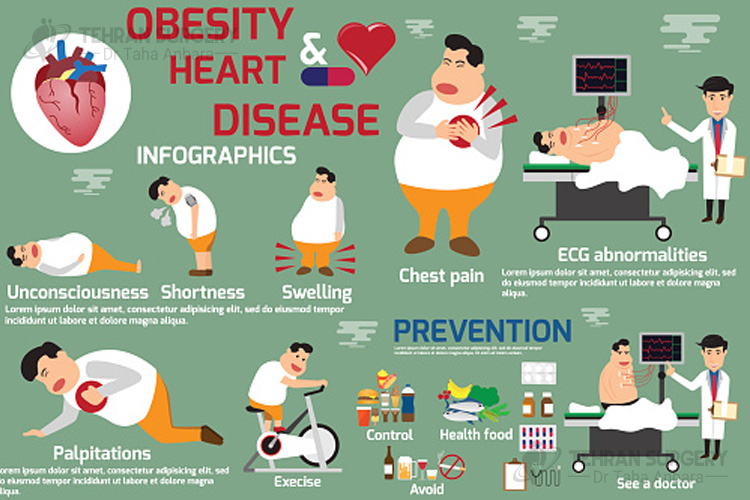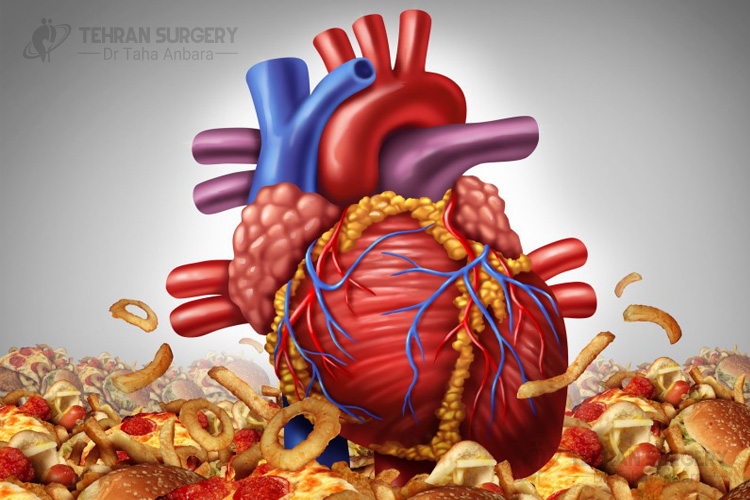
Obesity and heart disease
Today obesity is becoming a global problem not only for adults but also for children. Obesity means carrying too much fat on the body that hurt individual health. Obesity affects the quality of life and is associated with some health problems such as type 2 diabetes, sleep apnea, heart disease, and certain cancers.
What is heart disease?
Heart disease is a range of conditions that affect the heart and often use commutable with the term of cardiovascular disease. Conditions that involve narrowed or blocked blood vessels like chest pain, heart attack and stroke consider as cardiovascular disease and the other heart conditions such as those affect valves, rhythm and heart’s muscle refer to heart disease.
There are different types of heart disease that may occur in different ways and affect different parts of the organ such as congenital heart disease, coronary artery disease, arrhythmia, myocardial infarction, dilated cardiomyopathy, mitral regurgitation, heart failure, hypertrophic cardiomyopathy, pulmonary stenosis, and mitral valve prolapse.
There are some facts about heart disease as follow:
- Exercising and quitting smoking are helpful to prevent heart disease.
- One out of four deaths in the U.S is related to heart disease.
- Herat disease can treat by medication or surgery.
- Arrhythmia, myocardial infarction, and coronary heart disease are samples of heart disease.
Heart disease causes
Different lifestyle can increase the risk of heart disease including:
- Smoking
- Diabetes
- Overweight and obesity
- Age
- A diet of junk food
- Staying in a stationary position for extended periods of time like sitting at work
- A history of preeclampsia
- High blood pressure and cholesterol
- Family history
Although some of these risk factors are unavoidable such as age or family history, having a healthy lifestyle greatly can decrease the risk of heart disease.
How obesity is contributing to heart disease?
Obesity contributes to heart disease in three ways but keeps it in your mind that you can control obesity and also heart disease.
- Obesity changes the cholesterol levels and causes a point in bad cholesterol and triglyceride levels as well as decreasing good high-density lipoproteins (HDL) cholesterol which is important to remove bad cholesterol. HDL cholesterol also decrease the risk of heart disease.
- Obese people have high blood pressure because they need more blood to supply oxygen and nutrients to their bodies and also need more pressure to move this blood around. High blood pressure can cause a heart attack which is common among obese people.
- Obesity can also cause some other diseases such as diabetes. According to the American Heart Association, at least 68 percent of people aged 65 or older with diabetes suffer from heart disease. The risk of heart disease is two to four times more for the individual with diabetes.
Who is at increased risk for heart disease?

If you want to determine if you are at the risk of heart disease you should consider two measurements, Body Mass Index (BMI) and Waist Circumference.
BMI is a mathematical formula that determines obesity base on the individual’s height and weight. People with BMI below 18.5 are considered as underweight, people with BMI 18.5 – 24.9 are normal, between 25 – 29.9 are overweight and obese people have BMI 30 and above. Overweight and obese people are at higher risk of heart disease at least two times more and should lose weight to decrease the risk of heart disease. One of the effective ways to lose weight is bariatric surgery such as sleeve gastrectomy surgery and bypass surgery. Weight loss surgery also known as bariatric surgery is a good option for obese people who couldn’t lose weight by different food diet and exercise.
Waist circumference measures your waist, just above your navel, to predict the abdominal fat that is a risk factor for heart disease. If men waist measurement is over 40 inches and for women is over 35 inches, they are at increased risk for heart disease.
Generally, obesity is one of the important risk factors of heart disease and obese and overweight people are at a higher risk for different types of heart disease.










